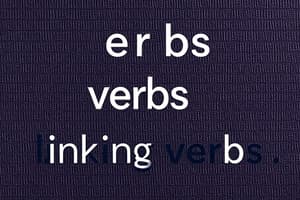Podcast
Questions and Answers
What function do helping verbs serve in a sentence?
What function do helping verbs serve in a sentence?
- They show the main action only.
- They assist the main verb to form a verb phrase. (correct)
- They replace the main verb in the sentence.
- They act as standalone predicates.
Which of the following is NOT a helping verb?
Which of the following is NOT a helping verb?
- will
- have
- can
- run (correct)
How can you determine if an orange verb is a helping verb or a linking verb?
How can you determine if an orange verb is a helping verb or a linking verb?
- If it stands alone, it is a linking verb. (correct)
- If it is the first verb in a verb phrase, it is a linking verb.
- If it begins the sentence, it is a helping verb.
- If it is followed by an adverb, it is a helping verb.
Which of the following sentences contains a verb phrase?
Which of the following sentences contains a verb phrase?
Which of the following options contains only linking verbs?
Which of the following options contains only linking verbs?
Which of the following is an example of a helping verb?
Which of the following is an example of a helping verb?
What is a verb phrase?
What is a verb phrase?
Which helping verbs can indicate future action?
Which helping verbs can indicate future action?
In the sentence 'She has finished her homework,' what role does 'has' play?
In the sentence 'She has finished her homework,' what role does 'has' play?
Which of the following lists contains only helping verbs?
Which of the following lists contains only helping verbs?
Which of the following sentences uses a helping verb correctly?
Which of the following sentences uses a helping verb correctly?
What distinguishes helping verbs from action verbs?
What distinguishes helping verbs from action verbs?
Which sentence includes a helping verb indicating a possibility?
Which sentence includes a helping verb indicating a possibility?
Which sentence correctly uses a helping verb in the future tense?
Which sentence correctly uses a helping verb in the future tense?
Identify the verb phrase in the sentence: 'We could have eaten lunch at noon.'
Identify the verb phrase in the sentence: 'We could have eaten lunch at noon.'
What role does the verb 'is' play in the sentence 'The bulldog is licking the boy’s face.'?
What role does the verb 'is' play in the sentence 'The bulldog is licking the boy’s face.'?
Which adverb is NOT part of the verb phrase in 'We could not have eaten lunch at noon.'?
Which adverb is NOT part of the verb phrase in 'We could not have eaten lunch at noon.'?
In the sentence 'Kerry was happy about her grades.', what is the function of the verb 'was'?
In the sentence 'Kerry was happy about her grades.', what is the function of the verb 'was'?
Which of the following sentences contains an action verb?
Which of the following sentences contains an action verb?
Which sentence contains a helping verb correctly used with a negative?
Which sentence contains a helping verb correctly used with a negative?
Which of the following statements about verb phrases is true?
Which of the following statements about verb phrases is true?
Flashcards
Linking Verbs
Linking Verbs
Linking verbs connect the subject of a sentence to a word that describes or identifies it.
Examples of Linking Verbs
Examples of Linking Verbs
Common linking verbs include: am, is, are, was, were, be, being, been, look, appear, become, taste, seem, feel, sound, remain, smell.
Helping Verbs
Helping Verbs
Helping verbs support the main verb in a verb phrase, indicating tense and mood.
Verb Phrase
Verb Phrase
Signup and view all the flashcards
Identifying Linking vs. Helping Verbs
Identifying Linking vs. Helping Verbs
Signup and view all the flashcards
Action Verb
Action Verb
Signup and view all the flashcards
Linking Verb
Linking Verb
Signup and view all the flashcards
Helping Verb
Helping Verb
Signup and view all the flashcards
Verb Phrase
Verb Phrase
Signup and view all the flashcards
Main Verb
Main Verb
Signup and view all the flashcards
Context Clues (Verbs)
Context Clues (Verbs)
Signup and view all the flashcards
Examples of Linking Verbs
Examples of Linking Verbs
Signup and view all the flashcards
Examples of Helping Verbs
Examples of Helping Verbs
Signup and view all the flashcards
Helping Verb
Helping Verb
Signup and view all the flashcards
Verb Phrase
Verb Phrase
Signup and view all the flashcards
Linking Verb
Linking Verb
Signup and view all the flashcards
Identifying Helping vs. Linking
Identifying Helping vs. Linking
Signup and view all the flashcards
Action Verb
Action Verb
Signup and view all the flashcards
Main Verb
Main Verb
Signup and view all the flashcards
Verb Phrase Structure
Verb Phrase Structure
Signup and view all the flashcards
Identifying Adverbs
Identifying Adverbs
Signup and view all the flashcards
Study Notes
Action Verbs
- Describe actions that can be seen
- Examples: kick, cook, fly, saw
- Also describe actions that can't be seen
- Examples: think, hope, consider
Linking Verbs
- Do not show action
- Connect the subject to another word in the sentence
- Common examples: am, is, are, was, were, be, being, been
- Other examples: look, appear, become, taste, seem, feel, sound, remain, smell
Helping Verbs
- Help the main verb in a sentence
- A main verb plus helping verbs is a verb phrase
- The main verb is always the last one in the phrase
- The main verb can be an action or a linking verb, but not a helping verb
- Common helping verbs include: am, is, are, was, were, be, being, been, have, has, had, do, does, did, could, would, should, may, might, must, can, will, shall
Verb Phrase Warning
- Orange verbs can be tricky, being both linking and helping verbs depending on use
- If an orange verb is followed by another verb, it's a helping verb
- If it stands alone and isn't followed by another verb, it's a linking verb
Important Adverbs
- Adverbs in verb phrases are not part of the verb phrase
- Examples: not, never, often, sometimes, even, only, really, soon
Studying That Suits You
Use AI to generate personalized quizzes and flashcards to suit your learning preferences.




